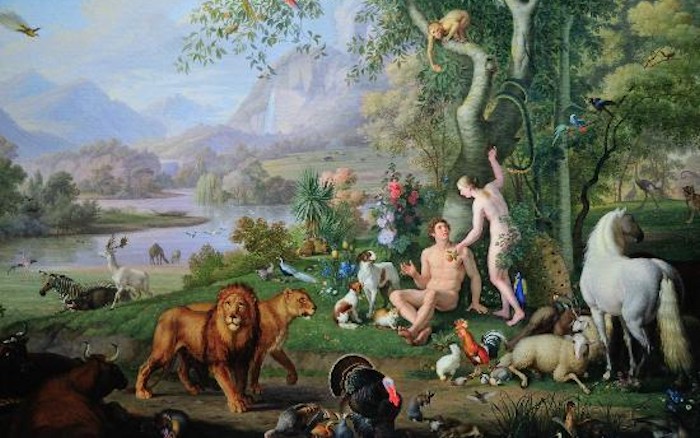Genesis 3:14-19
Session 3: Week 3
Genesis 3:14-19
14 Then the Lord God said to the serpent: Because you have done this, you are cursed more than any livestock and more than any wild animal. You will move on your belly and eat dust all the days of your life. 15 I will put hostility between you and the woman, and between your seed and her seed. He will strike your head, and you will strike his heel. 16 He said to the woman: I will intensify your labor pains; you will bear children in anguish. Your desire will be for your husband, yet he will rule over you. 17 And He said to Adam, “Because you listened to your wife’s voice and ate from the tree about which I commanded you, ‘Do not eat from it’: The ground is cursed because of you. You will eat from it by means of painful labor all the days of your life. 18 It will produce thorns and thistles for you, and you will eat the plants of the field. 19 You will eat bread by the sweat of your brow until you return to the ground, since you were taken from it. For you are dust, and you will return to dust.”
Herein begins the sentence proclaimed by God upon the serpent, Adam and Eve for their rebellion and disobedience. First the serpent was cursed and it seems that its legs were removed, causing it to eat dust. Interesting to think that snakes might have had legs, but maybe this is referring more to the enemy in that his mobility has been limited on the earth. Only God really knows, but it’s interesting to think about.
What other things could this signify?
Some say that Genesis 3:15 is the first time we encounter the Gospel message in scripture. The first part of sharing the Gospel (good news) with anyone is to tell them there is bad news. In this case the bad news is that God has put enmity (hostility) between the snake and the woman and between their seed, meaning their descendants. The idea of the “seed” leads into some very provocative teachings with regard to the Nephalim (we read about that in Genesis 6) and other controversial subjects that are prevalent online and in certain teaching circles. (Talk about the ministries I’ve encountered and Proverbs 3:7 Do not be wise in your own eyes; Fear the Lord and turn away from evil.8 It will be healing to your body and refreshment to your bones.)
If you want to use the new Discussion Board that would be the perfect place for more conversation on this.
Ok, back to the good news. While the serpent strikes the heel of the woman’s seed, the woman’s seed strikes the head of the serpent’s seed. Many say this is talking about Yeshua/Jesus’ blow to satan when He went to the cross and God raised Him from the dead, conquering sin and death forever. This is not just good news – it’s great news. In 1 Corinthians 15 Paul tells us this is the true essence of the Gospel message.
Back to Genesis 3: The serpent travels on its belly in the dust and the man is upright as he walks on the earth. This fact brings good news based on how each of our species moves on the earth. It seems that mankind has been given the upper hand and the ability to bruise the serpents head, which seems to be much more crucial than bruising man’s heel. Does anyone have any thoughts about this?
Next God tells Eve something very provocative. He said that it was going to hurt a lot to have children but she’d desire her husband and he’d rule over her. To my mind this means she wouldn’t be able to resist the sexual advances of her husband even knowing the consequences of child-bearing. I hope I don’t get too lewd here, but to my mind there is something very dominating about the act of procreation and I wonder if God had other ways that Adam and Eve were to be fruitful and multiply before the fall. I’ve never thought of that before. Intriguing indeed. Maybe there were supernatural gifts that Adam would be given, like forming his children out of the dust of the earth, like God did. Now that’s quite a thought. It’s not impossible I guess.
This could also point to the idea that Adam and Eve would no longer be co-rulers and equals, but Adam would rule over Eve. We see this alot in society in very unhealthy ways.
Next God tells Adam that the ground is now cursed because he gave up his authority and listened to Eve who was deceived by the serpent.
In Romans 8 the Apostle Paul talks about when this will be corrected and God uses Him to direct our minds to the future
18 For I consider that the sufferings of this present time are not worth comparing with the glory that is going to be revealed to us. 19 For the creation eagerly waits with anticipation for God’s sons to be revealed. 20 For the creation was subjected to futility—not willingly, but because of Him who subjected it—in the hope 21 that the creation itself will also be set free from the bondage of corruption into the glorious freedom of God’s children. 22 For we know that the whole creation has been groaning together with labor pains until now. 23 And not only that, but we ourselves who have the Spirit as the firstfruits—we also groan within ourselves, eagerly waiting for adoption, the redemption of our bodies.24 Now in this hope we were saved, yet hope that is seen is not hope, because who hopes for what he sees? 25 But if we hope for what we do not see, we eagerly wait for it with patience.
What does it mean to eagerly and patiently wait for the redemption of our bodies and the time when all of creation is set free?
Revelation 21 Then I saw a new heaven and a new earth, for the first heaven and the first earth had passed away, and the sea no longer existed. 2 I also saw the Holy City, new Jerusalem, coming down out of heaven from God, prepared like a bride adorned for her husband. 3 Then I heard a loud voice from the throne: Look! God’s dwelling is with humanity, and He will live with them. They will be His people, and God Himself will be with them and be their God. 4 He will wipe away every tear from their eyes. Death will no longer exist; grief, crying, and pain will exist no longer, because the previous things have passed away. 5 Then the One seated on the throne said, “Look! I am making everything new.” He also said, “Write, because these words are faithful and true.” 6 And He said to me, “It is done! I am the Alpha and the Omega, the Beginning and the End. I will give water as a gift to the thirsty from the spring of life. 7 The victor will inherit these things, and I will be his God, and he will be My son. 8 But the cowards, unbelievers,[f]vile, murderers, sexually immoral, sorcerers, idolaters, and all liars—their share will be in the lake that burns with fire and sulfur, which is the second death.”
I love this passage in Scripture. Remember that our main purpose in these Bible studies is to get to know God more. What does this passage in light of what we’re reading in Genesis 3 teach you about God and His ways?
Genesis 3:17-19 continues to outline the curse that fell on both Adam and the earth.
First it was going to take “painful labor” for Adam to work the land and get food. This was so different that what he had experienced when God had been the provider. Think about it. Adam and Eve could walk through the garden and the food was just there for them. Then when they disobeyed God Adam was going to have to “painfully labor” to get food.
Pain was the predominant theme of the consequences of Adam and Eve’s disobedience. Eve would experience pain in childbirth and Adam would experience pain in providing food for his family.
Why do you think God instituted such a drastic outcome to their disobedience?
Each day we have choices to make. Choices to obey God’s Word or not. I believe that there’s an element of the pre-fall existence that comes into our lives when we embrace the new life that comes by being born-again by God’s Holy Spirit, through our faith in Christ.
How have you experienced that in your life?
This passage ends with God’s humbling reminder to Adam that he is dust and will return to the dust. God wanted Adam to know beyond a shadow of a doubt that though he had eaten of the tree he was nothing like God. In fact the opposite was now true. The serpent had lied to him and he had bought it hook, line and sinker.
Looking back at this story from our vantage point after the cross we can thank God that Yeshua/Jesus has become the second Adam and He has reversed the curse that God put on Adam. Let’s read about that in 1 Corinthians 15
45 So it is written: The first man Adam became a living being; the last Adam became a life-giving Spirit. 46 However, the spiritual is not first, but the natural, then the spiritual. 47 The first man was from the earth and made of dust; the second man is from heaven. 48 Like the man made of dust, so are those who are made of dust; like the heavenly man, so are those who are heavenly. 49 And just as we have borne the image of the man made of dust, we will also bear the image of the heavenly man.50 Brothers, I tell you this: Flesh and blood cannot inherit the kingdom of God, and corruption cannot inherit in corruption. 51 Listen! I am telling you a mystery: We will not all fall asleep, but we will all be changed, 52 in a moment, in the blink of an eye, at the last trumpet. For the trumpet will sound, and the dead will be raised incorruptible, and we will be changed. 53 For this corruptible must be clothed with incorruptibility, and this mortal must be clothed with immortality. 54 When this corruptible is clothed with incorruptibility, and this mortal is clothed with immortality, then the saying that is written will take place: Death has been swallowed up in victory. 55 Death, where is your victory? Death, where is your sting?56 Now the sting of death is sin, and the power of sin is the law. 57 But thanks be to God, who gives us the victory through our Lord Jesus Christ! 58 Therefore, my dear brothers, be steadfast, immovable, always excelling in the Lord’s work, knowing that your labor in the Lord is not in vain.
God shows us His order here. The natural first and then the spiritual; earth then heaven. Adam then Yeshua. We experience that in our lives too. Our natural birth and then our spiritual birth. As we walk out our lives after that it’s all about a restoration of the divine qualities that Adam and Eve lost by their disobedience. We look to Yeshua as our model and seek to become imitators of God as instructed in Ephesians 5:1-2. “Therefore be imitators of God, as beloved children; 2 and walk in love, just as Christ also loved you and gave Himself up for us, an offering and a sacrifice to God as a fragrant aroma.”
One last question this week: How much of this do you think is God’s work in us and how much do you think is our responsibility?






